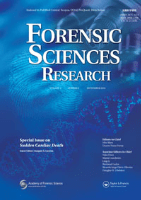
Forensic Sciences Research
Scope & Guideline
Connecting Research and Real-World Forensics
Introduction
Aims and Scopes
- Forensic Genetics and DNA Analysis:
The journal extensively publishes research on genetic profiling, DNA databases, and the application of genetic markers in forensic investigations, reflecting the increasing reliance on genetic evidence in criminal cases. - Forensic Anthropology and Human Identification:
Papers often focus on methodologies for identifying human remains, including skeletal analysis, age estimation, and population genetics, showcasing the journal's commitment to improving human identification practices. - Forensic Toxicology and Substance Analysis:
Research in this area includes toxicological evaluations, drug analysis, and the implications of substances in forensic contexts, highlighting the journal's focus on the intersection of toxicology and legal investigations. - Technological Innovations in Forensics:
The journal explores advancements in forensic technologies, such as imaging techniques, machine learning applications, and digital forensics, which are crucial for modern forensic science. - Ethical and Humanitarian Issues in Forensic Science:
There is a consistent focus on the ethical dimensions of forensic practices, particularly in humanitarian contexts, emphasizing the role of forensics in human rights and disaster victim identification.
Trending and Emerging
- Interdisciplinary Approaches in Forensics:
Recent publications highlight the integration of various scientific disciplines into forensic science, such as psychology, anthropology, and data science, which enhance the understanding of forensic phenomena. - Digital Forensics and Cybercrime:
With the rise of technology, there is an increasing emphasis on digital forensics, including the analysis of digital evidence and cybercrime investigations, aligning with global trends in crime. - Humanitarian Forensic Action and Human Rights:
Emerging themes focus on the humanitarian aspects of forensic science, particularly in addressing human rights violations and disaster victim identification, reflecting a growing concern for ethical practices. - Advancements in Forensic Technologies:
The journal has seen a surge in research on new technologies, such as machine learning, artificial intelligence, and advanced imaging techniques, which are revolutionizing forensic investigations. - Genetic Diversity and Population Genetics:
There is a notable trend towards studying genetic diversity within specific populations, which aids in improving forensic methodologies and understanding population-specific forensic applications.
Declining or Waning
- Traditional Forensic Methods Without Technological Integration:
There is a noticeable decrease in papers focusing solely on traditional forensic methods that do not integrate modern technology or analytical techniques, as the field shifts towards more innovative approaches. - Narrowly Focused Case Studies:
The journal has seen fewer narrowly focused case studies that do not contribute broadly to forensic science principles or methodologies, indicating a trend towards more comprehensive, integrative studies. - General Overviews of Forensic Disciplines:
Publications that provide general overviews of forensic disciplines without new insights or methodologies have become less common, as the journal emphasizes original research and advancements.
Similar Journals

Forensic Imaging
Fostering breakthroughs in forensic evidence analysis and application.Forensic Imaging is a premier international journal dedicated to advancing the field of forensic science through the analysis and implementation of imaging techniques. Published by ELSEVIER, this open access journal provides a platform for researchers, professionals, and students to disseminate innovative studies that bridge the disciplines of Pathology, Forensic Medicine, and Radiology. Since its inception in 2020, it has gained recognition and holds a respectable Q3 ranking in its categories for both Pathology and Forensic Medicine and Radiology, Nuclear Medicine and Imaging, reflecting its commitment to high-quality, impactful research. The journal's practical focus on imaging methodologies offers valuable insights into forensic investigations and enhances professional practices, making it an essential read for those involved in forensic research and application. Available in both print and online formats, Forensic Imaging serves as a vital resource for fostering breakthroughs in the analysis of forensic evidence.
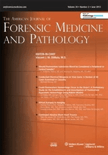
AMERICAN JOURNAL OF FORENSIC MEDICINE AND PATHOLOGY
Unveiling Truths Through Forensic InnovationThe American Journal of Forensic Medicine and Pathology is a pivotal publication within the field of forensic science and pathology, dedicated to disseminating influential research and advancements in the evaluation of death and injury in legal contexts. Published by Lippincott Williams & Wilkins, this journal, which has been in circulation since 1980, serves as a vital resource for professionals, researchers, and students focused on intersecting disciplines such as medicine and forensic investigations. While it holds a respectable Q3 ranking in both the Medicine (Miscellaneous) and Pathology and Forensic Medicine categories as of 2023, the journal's impact is underscored by its contributions to the ongoing dialogue on forensic practices and methodologies. The American Journal of Forensic Medicine and Pathology provides a platform for innovative papers that shape the future of forensic science, also offering insights through case studies, reviews, and research articles that cater to its diverse readership. With an ISSN of 0195-7910 and E-ISSN 1533-404X, the journal continues to support the scholarly community in advancing knowledge within this critical field.

International Journal of Electronic Security and Digital Forensics
Fostering collaboration for cutting-edge cybersecurity insights.The International Journal of Electronic Security and Digital Forensics, published by INDERSCIENCE ENTERPRISES LTD, is a leading platform for disseminating scholarly research in the realms of cybersecurity, digital forensics, and electronic security. Established with the objective of bridging the gap between theoretical advancements and practical applications, the journal spans critical areas such as network security, legal implications of digital forensics, and reliability in safety measures. With its ISSN 1751-911X and E-ISSN 1751-9128, the journal aims to provide valuable insights into emerging technologies and methodologies while maintaining high academic standards, as reflected in its diverse quartile rankings across multiple categories in 2023. Operating from the United Kingdom and catering to a global audience, the journal is committed to fostering innovative research that contributes to safer digital environments. Researchers, professionals, and students will find a wealth of information and opportunities for collaboration in this specialized field, making International Journal of Electronic Security and Digital Forensics an essential resource for advancing knowledge and practice.
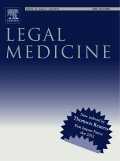
Legal Medicine
Exploring the intersection of health and justice.Legal Medicine, ISSN 1344-6223, published by ELSEVIER IRELAND LTD, stands as a pivotal academic journal within the realms of forensic medicine and legal ethics. Operating from the Netherlands, this journal has established a strong reputation among researchers and practitioners since its inception in 1999, with the goal of advancing knowledge in the intersection of legal and medical disciplines. With a commendable Q2 categorization in both Issues, Ethics and Legal Aspects and Pathology and Forensic Medicine, it ranks among the noteworthy publications in these fields, placing it in the 51st percentile for Pathology and Forensic Medicine and 51st for Nursing-related ethical issues. The journal not only serves as a repository for innovative research and practical case studies but also emphasizes the importance of ethical considerations in medical legal scenarios. Although it does not offer Open Access options, it remains a crucial resource for professionals, researchers, and students seeking to stay informed about the latest developments that shape legal medicine. Access to its contents promises to enhance understanding and inspire advancements in both forensic science and the ethical frameworks surrounding them.
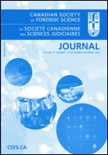
Canadian Society of Forensic Science Journal
Fostering Innovation in Forensic Pathology and MedicineThe Canadian Society of Forensic Science Journal, published by Routledge Journals, Taylor & Francis Ltd, serves as a vital platform for the dissemination of research in the field of forensic science, particularly focusing on pathology and forensic medicine. With a rich history since 1968 and an impressive commitment to academic rigor, this journal has established itself as an essential resource for researchers, practitioners, and students alike. Recognized within the Q3 category in the 2023 Scimago Journal Rank in Pathology and Forensic Medicine, it ranks #162 out of 208 journals in its category, affirming its relevance and contribution to the field. While it does not operate under an open access model, the journal remains accessible through institutions and libraries and provides critical insights into advancements and best practices in forensic science. Through its comprehensive approach, the journal aims to advance forensic knowledge and contribute to the professional development of those engaged in this pivotal area of study.
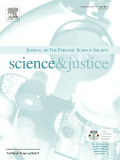
SCIENCE & JUSTICE
Unraveling Truth at the Intersection of Science and Law.Science & Justice is a leading international journal published by Elsevier Science Ltd, dedicated to the interdisciplinary examination of the intersection of justice and science, especially within the realms of forensic science and pathology. Established in 1995, this reputable journal has garnered a commendable Q2 rank in the category of Pathology and Forensic Medicine, reflecting its significant contributions to advancing knowledge in these critical fields. With an ISSN of 1355-0306 and an E-ISSN of 1876-4452, the journal is indexed in Scopus, positioning it in the top 68th percentile among its peers. The objectives of Science & Justice include promoting research that bridges scientific methodologies with justice-related applications, making it an invaluable resource for researchers, professionals, and students alike. As the journal continues to evolve, it aims to interface scientific innovations with forensic practices, thereby enhancing the integrity of justice processes globally. Despite not offering Open Access options, it remains a pivotal reference point within the academic community focused on forensic science methodologies and their legal implications.
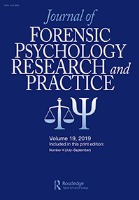
Journal of Forensic Psychology Research and Practice
Unlocking the Complexities of Forensic Psychology.Journal of Forensic Psychology Research and Practice is a distinguished publication within the fields of Applied Psychology and Pathology and Forensic Medicine, published by Routledge Journals, Taylor & Francis Ltd. With a commitment to advancing knowledge from 2017 to 2024, this journal aims to bridge theory and practice by showcasing empirical research, including case studies and innovative methodologies, that address the complexities of forensic psychology in contemporary settings. While it holds a respectable Q3 ranking in both Applied Psychology and Pathology and Forensic Medicine, making it a vital resource for scholars and practitioners alike, its insights contribute significantly to understanding the psychological aspects of criminal behavior and legal processes. Researchers, professionals, and students are encouraged to engage with its content to further their understanding and application of forensic psychology principles in real-world scenarios.

MEDICINE SCIENCE AND THE LAW
Bridging the Gap Between Health Policy and Legal FrameworksMEDICINE SCIENCE AND THE LAW is a prestigious journal published by SAGE PUBLICATIONS INC, focused on the intersection of law, health policy, and ethical issues as they pertain to medicine. With a long-standing history dating back to 1960, this journal has become a crucial platform for scholars and professionals alike to share and disseminate research that shapes the evolving legal landscape surrounding health care practices. It holds notable positions in the academic community, ranking in the Q3 category for Health Policy and Issues, Ethics and Legal Aspects, and achieving a distinguished Q1 ranking in Law as of 2023. With rigorous peer-review standards and a commitment to publishing high-quality research, MEDICINE SCIENCE AND THE LAW is invaluable for those exploring the critical legal challenges and ethical dilemmas faced within the healthcare sector. Research contributions are vital for informing policy and practice, ensuring that the journal remains a relevant and essential resource for researchers, practitioners, and students dedicated to the intersection of law and medicine.

Forensic Toxicology
Advancing the Science of Toxicology in Forensic InvestigationsForensic Toxicology is a premier journal published by Springer, renowned for delivering cutting-edge research in the realms of toxicology, biochemistry, and forensic medicine. With an ISSN of 1860-8965 and an E-ISSN of 1860-8973, this journal has established itself as a significant resource for professionals, researchers, and students engaged in the analysis of toxic substances within a forensic context. Its impressive impact factor and ranking reveal its influential presence in the field, particularly as it is categorized in Q1 for Pathology and Forensic Medicine and Q2 for Biochemistry (Medical) and Toxicology. Featured articles span a wide array of topics, facilitating interdisciplinary collaboration and advancing scientific knowledge. While currently not an open-access journal, it remains accessible through institutional subscriptions. With a convergence span from 2006 to 2024, Forensic Toxicology is committed to publishing high-quality research that enhances the understanding of toxicological phenomena and their implications in forensic investigations, reinforcing its role as an indispensable resource in the scientific community.
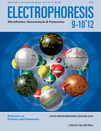
ELECTROPHORESIS
Advancing the Frontiers of Electrophoretic ScienceELECTROPHORESIS, published by Wiley, stands as a premier journal dedicated to advancing the field of analytical chemistry, biochemistry, and clinical biochemistry. With an ISSN of 0173-0835 and an E-ISSN of 1522-2683, this journal has been a vital resource since its inception in 1980 and is poised to continue its journey through to 2024. Operating out of Germany, it holds a significant standing in the academic community, featuring in the Q2 category for Analytical Chemistry and in the Q3 tier for both Biochemistry and Clinical Biochemistry as of 2023. The journal ranks impressively within Scopus, occupying the 43rd position out of 156 in Analytical Chemistry and the 44th spot out of 117 in Clinical Biochemistry, ensuring its relevance and impact in these disciplines. Although it does not currently offer open access, ELECTROPHORESIS remains an essential publication for researchers, professionals, and students seeking cutting-edge insights and developments that influence the methodologies and technologies underpinning electrophoretic techniques.